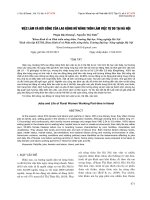New records of the Dictyocha antarctica Lohmann, Dictyocha crux Ehrenberg and Nitzschia rectilonga Takano species from the sea of Marmara
Bạn đang xem bản rút gọn của tài liệu. Xem và tải ngay bản đầy đủ của tài liệu tại đây (123.88 KB, 4 trang )
Turk J Bot
30 (2006) 213-216
â TĩBTAK
Research Article
New Records of the Dictyocha antarctica Lohmann,
Dictyocha crux Ehrenberg and Nitzschia rectilonga Takano
Species from the Sea of Marmara
Niyazi DENZ1, Seyfettin TAfi1, Tufan KORAY2
1stanbul
2Ege
University, Institute of Marine Sciences and Management, 34470, Vefa, stanbul - TURKEY
University, Faculty of Fisheries, Department of Hydrobiology, 35100,Bornova, zmir - TURKEY
Received: 17.06.2005
Accepted: 16.01.2006
Abstract: The silicoflagellate species Dictyocha antarctica Lohmann, Dictyocha crux Ehrenb. and the diatom species Nitzschia
rectilonga Takano are reported for the first time from the coastal waters of the north-eastern Sea of Marmara (lat. 40 45.80` N 40 58.00` N, long. 28 36.00` E - 29 13.60` E) and also from the coastal waters of Turkey. Descriptions of these species are given
in this paper.
Key Words: Dictyocha antarctica, Dictyocha crux, Nitzschia rectilonga, phytoplankton, Sea of Marmara
Marmara Denizinde Dictyocha antarctica Lohmann, Dictyocha crux Ehrenb. ve
Nitzschia rectilonga Takano Tỹrleri ĩzerine Yeni Kaytlar
ệzet: Bu ỗalflmada silikoflagellatlara ait Dictyocha antarctica Lohmann, Dictyocha crux Ehrenb. ve diyatomlara ait Nitzschia rectilonga
Takano tỹrleri KuzeydoÔu Marmara Denizinden (enlem: K 40 45.80` - K 40 58.00`, boylam: D 28 36.00` - D 29 13.60`) ve
Tỹrkiye Denizleri kysal sularndan ilk kez rapor edilmifltir. Bu yaynda bu tỹrlerin ửzellikleri verilmifltir.
Anahtar Sửzcỹkler: Dictyocha antarctica, Dictyocha crux, Nitzschia rectilonga, fitoplankton, Marmara Denizi
Introduction
Materials and Methods
Dictyocha antarctica Lohmann and Dictyocha crux
Ehrenb. are members of the class Dictyochophyceae. The
members of this class generally have a silicated skeleton
and their shape is extremely variable. Three species and 3
varieties from the genus Dictyocha Ehrenb. have been
recorded from the Sea of Marmara. Nitzschia rectilonga
Takano is a member of the class Bacillariophyceae in
Round et al. (1990). Five species from the genus
Nitzschia Hassall have been recorded from Turkish
coastal waters (Koray, 2001). Two species from the
genus Dictyocha Ehrenb. and 1 species from the genus
Nitzschia have been recorded from the Sea of Marmara
(Balks, 2004).
The samples were collected from the north-eastern
Sea of Marmara (lat. 40 45.80` N - 40 58.00` N, long.
28 36.00` E - 29 13.60` E). The study area and the
locations of the sampling points are shown in Figure 1.
The phytoplankton samples were collected from different
depths (0.5, 5 and 10 m) with a Niskin bottle and with a
55 àm mesh standard plankton net from 15 m to the
surface, and the samples were preserved in 4%
formaldehyde (Throndsen, 1978). A light microscope
was used for identification of the species and a Nikon
Diaphot 300 light microscope and a video camera was
used to photograph them. For identification and
taxonomy Bernhard (1980), Cupp (1943), Drebes
(1974), Hendey (1964), Tomas (1997), Priddle and
Fryxell (1985), Rehakova (1974), Ricard and Dorst
(1987), Trộgouboff and Rose (1957) were used.
This study adds these 3 species to the regional checklist of the microplankton species of Turkish seas.
213
New Records of the Dictyocha antarctica Lohmann, Dictyocha crux Ehrenberg and Nitzschia rectilonga Takano Species from the Sea of Marmara
Europe
Asia
41° 00’ N
M3
MBC1
M8
Sea of Marmara
M11
40° 50’ N
MY2
M23
MY1
M20
28° 40’ E
28° 50’ E
29° 00’ E
29° 10’ E
Figure 1. The study area and the location of sampling points.
Result and Discussion
Dictyocha antarctica Lohmann 1919
The 3 species identified were very rarely sampled. The
locations, depths and dates are given in Table. During the
study period salinity was between 22-28 psu and
temperature was between 14-23 °C (Sur et al., 2000).
Dictyocha crux Ehrenb. 1840
The taxonomy of these species is given as follows
(Tomas, 1997):
Class: Bacillariophyceae Haeckel 1878 emend Mann in
Round et al. 1990
Subclass: Bacillariophycidae Mann in Round et al.
1990.
Class: Dictyochophyceae Silva 1980
Order: Bacillariales Hendey 1937 sensu emend
Family: Bacillariaceae Ehrenb. 1831.
Order: Dictyochales Haeckel 1894
Genus: Nitzschia Hassall 1845
Family: Dictyochaceae Lemmermann 1901
Nitzschia rectilonga Takano 1983
Genus: Dictyocha Ehrenb. 1837
Table. The date, station name, depth, and concentration information of the identified species.
Species name
Dictyocha antarctica
Dictyocha crux
Nitzschia rectilonga
Date
Station name
Depth (m)
Concentration (cells/l)
10.08.2000
10.08.2000
10.08.2000
15.11.2000
M20
M20
MY2
M3
5
10
5
15
250
500
250
Plankton net*
10.08.2000
26.10.2000
26.10.2000
26.10.2000
16.11.2000
16.11.2000
16.11.2000
16.11.2000
M20
MBC
MY1
MY1
MY1
M11
M8
M23
15
15
15
0.5
15
15
15
15
0
0
0
0
0
0
0
Plankton
Plankton
Plankton
250
Plankton
Plankton
Plankton
Plankton
16.11.2000
MY2
15
0
Plankton net*
* The concentration of the mesh standard plankton samples was not counted.
214
0
net*
net*
net*
net*
net*
net*
net*
N. DEN‹Z, S. TAfi, T. KORAY
The identification of the Dictyocha species is based on
the external SiO2 skeleton. The cells have one flagellum (+
one very short in naked phase) and many chloroplasts.
The morphology of the Nitzschia species is poorly known
and, as a consequence, so is their taxonomy.
circular to quadrangular with short spines. The
distribution is oceanic, cold waters; South Atlantic
(Tomas, 1997). A microscopic photo of it is given in
Figure 2a.
Dictyocha crux Ehrenb. 1840
Dictyocha antarctica Lohmann 1919
Their silicated skeleton size is 45-51 µm; they have
many yellowish chloroplasts. The skeleton is simple,
The silicated skeleton size is 20-40 µm and it has long
spines, 15 µm. The skeleton has 4 protruding spines and
5 “windows”. The distribution is oceanic; Mediterranean,
Figure 2. Microscopic photographs of species. a. Dictyocha antarctica, b. Dictyocha crux, c. Nitzschia rectilonga.
215
New Records of the Dictyocha antarctica Lohmann, Dictyocha crux Ehrenberg and Nitzschia rectilonga Takano Species from the Sea of Marmara
Atlantic and Pacific (Tomas, 1997). A microscopic photo
of it is given in Figure 2b.
Nitzschia rectilonga Takano 1983
The cell size is huge, the individual (Figure 2c) is 894
µm in length and 55 µm in width.
These 3 species are not small for a phytoplankton
study; however, because of their rare occurrence, these
species were not recorded or they may have been
neglected in previous studies carried out in the northeastern Sea of Marmara. On the other hand, the
recording of these species for the first time in this study
may be related to the lack of adequate studies in this
area. Another possibility is that they may have recently
been transported to the studied area by ballast waters,
especially D. antarctica, because its distribution does not
included the Mediterranean or Aegean seas. Moreover, in
the study area, there is a dry dock for the loading and
unloading of international ships.
References
Balk›s N (2004). List of Phytoplankton of the Sea of Marmara. J Black
Sea/Mediterranean Environment 10: 123-141.
Bernhard L (1980). Chiave Per La Peridinee Pelagiche Méditerranéenne.
Divisione Protezione Ambiente CNEN. I – Fiascherino Lerici (La
Spezia).
Cupp EE (1943). Marine Plankton Diatoms of the West Coast of North
America. Berkeley, California: University of California Press.
Drebes G (1974). Marines phytoplankton eine Auswahl der Helgolander
planktonalgen (Diatomeen, Peridineen). Stuttgart: Georg Thieme
Verlag.
Hendey NI (1964). An Introductory Account of the Smaller Algae of
British Coastal Waters Part V: Bacillariophyceae (Diatoms).
London: Her Majesty’s Stationery Office.
Koray T (2001). A check list for phytoplankton of Turkish Seas. Journal
of Fisheries and Aquatic Sciences, 18: 1-27.
Priddle J & Fryxell G (1985). Handbook of the common plankton
diatoms of the southern ocean. British Antarctic Survey. First
Edition. Cambridge: University Press.
Rehakova Z (1974). Marine diatoms in helvetion sediments of the
Central Paratethys. Third symposium on recent and marine
diatoms. September 9-13. OK 569 DS 4SIM.
216
Ricard M & Dorst J (1987). Atlas du phytoplankton marin
diatomophycées. Membre de l’Institut. Vol. II: Paris: Editions Du
Centre National De La Recherche Scientifique.
Round, F.E., Crawford, R.M. & Mann, D.G. 1990. The diatoms.
Cambridge University Press. p. 747.
Sur H‹, Do¤an E, Güven KC, Sarikaya HZ, Okufl E, Öztürk ‹ & Ero¤lu V.
(2000). Monitoring of the marine outfall system of the City of
Istanbul. In: Avanzini C (ed.). Marine Waste Water Discharges
2000: 295-305, Genova, Italy.
Thronsen J (1978). Preservation and storage. In: Sournia A (ed.).
Phytoplankton manual, UNESCO. pp. 69-74. UK: Page Brothers
(Norwich) Ltd.
Tomas CR (1997). Identifying Marine Phytoplankton. New York:
Academic Press, p. 858.
Trégouboff G, Rose M (1957). Manuel de planktonologie
Méditerranéenne, Tome II. Illustratios. Paris: Centre National De
La Recherche Scientifique.









